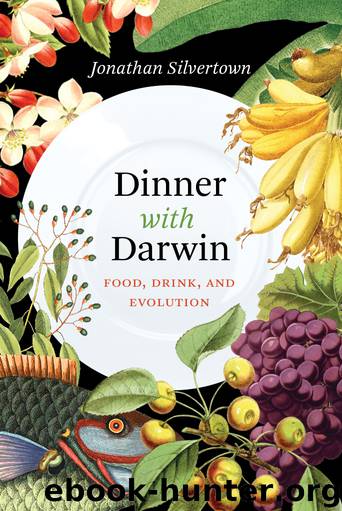Dinner with Darwin by Jonathan Silvertown

Author:Jonathan Silvertown [Silvertown, Jonathan]
Language: eng
Format: epub
ISBN: 9780226245393
Publisher: University of Chicago Press
Published: 2017-06-29T06:00:00+00:00
11
Cheese—Dairying
Milk is the only food that we can truthfully say has evolved expressly for our consumption. Cheese is the result of sharing this gift of evolution with other organisms that trade us a small fraction of its energy content in return for an inexhaustible bounty of flavors. Mammary glands and their sometimes prodigious output are so important to the sustenance and survival of all infant mammals that one might wonder how the ancestors of mammals got along without it. This is the kind of question that can be asked about any adaptation. Charles Darwin insisted in On the Origin of Species that evolution by natural selection is a gradual process and that nature does not make jumps, but rather takes tiny steps that cumulatively build to major change over very long periods of time. In fact, he regarded gradualism as so fundamental to evolution by natural selection that he made it a test of the theory and wrote: “If it could be demonstrated that any complex organ existed, which could not possibly have been formed by numerous, successive, slight modifications, my theory would absolutely break down.”
Zoologist St. George Mivart (1827–1900)—perhaps feeling impelled to live up to his mythical dragon-slaying namesake—persistently attacked Darwin’s theory along these lines, arguing that an incipient mammary gland in some long-ago ancestor of mammals would have been so rudimentary as to be useless to an infant: “Is it conceivable that the young of any animal was ever saved from destruction by accidentally sucking a drop of scarcely nutritious fluid from an accidentally hypertrophied cutaneous gland of its mother?” A loaded question if ever there was one.
As a young man, Mivart began as a supporter of Darwin’s theory, but although he continued to be an evolutionist of a sort, his religious convictions later led him to challenge the universality of natural selection and the absence from the theory of any form of design or direction from God. By the time that Darwin came to write the sixth and last edition of On the Origin of Species in 1872, he found the need to devote the majority of an entirely new chapter to answering Mivart’s various criticisms. In it Darwin wrote: “The mammary glands are common to the whole class of mammals, and are indispensable for their existence; they must therefore have been developed at an extremely remote period. . . .” But Darwin goes on to say that Mivart does not argue fairly when he questions the value to offspring of a rudimentary mammary gland because such an organ was already known in the duck-billed platypus, whose young suck milk directly from ducts in their mother’s skin. The skin is devoid of teats, and thus an infant platypus does what Mivart said was so improbable.
The platypus belongs to a strange group of egg-laying mammals called the monotremes, which are thought to resemble early mammals. The platypus is found only in the wilds of Australia and is nocturnal, hiding in deep burrows during the day. In 1872 the idea that they laid eggs was only an unconfirmed rumor.
Download
This site does not store any files on its server. We only index and link to content provided by other sites. Please contact the content providers to delete copyright contents if any and email us, we'll remove relevant links or contents immediately.
The Lonely City by Olivia Laing(4785)
Animal Frequency by Melissa Alvarez(4442)
All Creatures Great and Small by James Herriot(4294)
Walking by Henry David Thoreau(3938)
Exit West by Mohsin Hamid(3808)
Origin Story: A Big History of Everything by David Christian(3677)
COSMOS by Carl Sagan(3603)
How to Read Water: Clues and Patterns from Puddles to the Sea (Natural Navigation) by Tristan Gooley(3447)
Hedgerow by John Wright(3340)
How to Read Nature by Tristan Gooley(3314)
The Inner Life of Animals by Peter Wohlleben(3296)
How to Do Nothing by Jenny Odell(3287)
Project Animal Farm: An Accidental Journey into the Secret World of Farming and the Truth About Our Food by Sonia Faruqi(3207)
Origin Story by David Christian(3184)
Water by Ian Miller(3166)
A Forest Journey by John Perlin(3053)
The Plant Messiah by Carlos Magdalena(2914)
A Wilder Time by William E. Glassley(2846)
Forests: A Very Short Introduction by Jaboury Ghazoul(2823)
